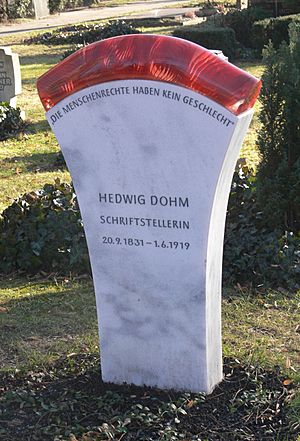Hedwig Dohm facts for kids
Hedwig Dohm (born Marianne Adelaide Hedwig Schlesinger) was a German writer and a strong supporter of women's rights. She lived from 1831 to 1919. Hedwig Dohm was one of the first thinkers to believe that gender roles were learned from society, not something people were born with. She played an important role in the early feminist movement in Germany.
Her Family and Early Life
Hedwig Dohm was born in Berlin, which was then the capital of Prussia. Her parents were from a Jewish background, but her father had converted to Protestantism. His name was Gustav Adolph Gotthold Schlesinger, and he made tobacco. Her mother was Wilhelmine Jülich. Hedwig's parents did not marry until 1838, some years after she was born. In 1851, her father changed his last name to Schleh.
Unlike her brothers, who went to a good school called a Gymnasium, Hedwig had to leave school at age 15. She needed to help with chores at home. Three years later, she started training to become a teacher.
In 1853, she married Ernst Dohm, a writer and actor. He was the main editor of a funny magazine called Kladderadatsch. Hedwig and Ernst had five children:
- Hans Ernst (1854–1866)
- Gertrude Hedwig Anna (1855–1942), who married a mathematician named Alfred Pringsheim
- Ida Marie Elisabeth "Else" (1856–1922)
- Marie Pauline Adelheid (1858–?)
- Eva (1859–?)
Through her daughter Gertrude Hedwig, Hedwig Dohm became the grandmother of Katia Mann (who married the famous writer Thomas Mann) and the musician Klaus Pringsheim Sr. Another granddaughter was Hedda Korsch.
Her Life and Work
Hedwig and her husband were part of a group of smart people in Berlin. In 1867, she published her first study. It was about the history of Spanish literature, which she had taught herself.
In the early 1870s, Hedwig Dohm started writing important essays about women's rights. She demanded that women should have equal rights in law, society, and work. She also strongly supported women's suffrage, which means the right for women to vote. These writings made her well-known, but some people disagreed with her. Even some other feminists thought she was asking for too much. They focused more on better education for young women. In the late 1870s, Hedwig wrote several funny plays. They were all performed in Berlin and were quite successful.
After her husband died in 1883, she started writing novels. Then, in the late 1880s, she wrote many more essays about the growing women's rights movement. Hedwig Dohm also started an organization called Reform. This group wanted to improve education and allow women to study at universities. She also joined other women's groups, like Frauenwohl (Women's Welfare) and the Bund für Mutterschutz (League for the Protection of Mothers). Her writing style was unique. She often made fun of men who claimed to have all the power. She also openly disagreed with the old-fashioned system where men were in charge. This was very new and brave for her time.
Hedwig Dohm was one of the few German thinkers who spoke out against the strong national pride before World War I. She wrote articles supporting peace in a left-wing magazine called Die Aktion. She lived long enough to see women get the right to vote in Germany after the German Revolution of 1918–19.
Hedwig Dohm passed away in Berlin at the age of 87. She is buried in a cemetery called Alter St.-Matthäus-Kirchhof in the Schöneberg area.
Her Literary Works
- Was die Pastoren von den Frauen denken, 1872
- Der Jesuitismus im Hausstande, 1873
- Die wissenschaftliche Emanzipation der Frau, 1874
- Der Frauen Natur und Recht, 1876
- Die Antifeministen. Ein Buch der Verteidigung, 1902
- Die Mütter. Ein Beitrag zur Erziehungsfrage, 1903
- Der Mißbrauch des Todes, 1915
Novels
- Werde die du bist. Wie Frauen werden, 2 novels 1894
- Sibilla Dalmar, 1896
- Schicksale einer Seele, 1899
- Christa Ruland, 1902
See also
 In Spanish: Hedwig Dohm para niños
In Spanish: Hedwig Dohm para niños
 | Delilah Pierce |
 | Gordon Parks |
 | Augusta Savage |
 | Charles Ethan Porter |


